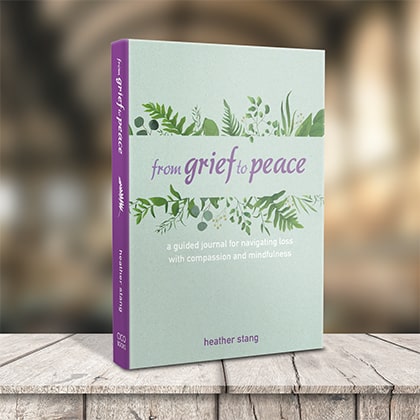In the 9th episode of the Mindfulness & Grief Podcast, Jana DeCristofaro of The Dougy Center, shares her wisdom on Children & Grief.
Hope Zvara has turned her suffering into a mission: Help Others Purposefully Excel by using the three Bs: Breathe, Body, and Belief. After struggling with an eating disorder, and hearing no news a parent should ever hear, Hope turned to yoga and mindfulness to help her through. Learn how she now helps other live their best life.
Meditation for grief can help you cope with the pain and overwhelming emotions of loss, provide much needed self-care, as well as find new footing in your very changed world. It may even lead to posttraumatic growth. Author Heather Stang discusses the second edition of her book, Mindfulness & Grief, with guest host Karla Helbert.
I write to think about questions that are preoccupying me. In my novel Landslide, I consider how resilience arises out of catastrophic loss. When I started the novel, my mother and three close friends had died. My husband had battled cancer. I had gone through unexplained, early menopause which also felt like sorrow and loss.
MINDFULNESS & GRIEF PODCAST EPISODE 3AhimsaThe Yogic Path to Self-Care During Grief With Karla Helbert SHOW NOTES Yoga for Grief & Loss author Karla Helbert, LPC, shares how the yogic practice of non-violence, called “ahimsa,” can help us be our own best friend during the difficult days, months, and years after a major loss. Drawing
MINDFULNESS & GRIEF PODCAST EPISODE 2The Kindness Rocks ProjectWith Megan Murphy SHOW NOTES When my husband and I found our first “kindness rock” in Hagerstown City Park on Easter Sunday, I had no idea that I was stumbling upon a worldwide movement rooted in a woman’s journey of love and loss, and her longing for guidance
Major Griffith, USMC, was killed in action on December 14, 2011 by an enemy Taliban sniper. Sam was a beloved Marine Corps Officer who embodied perseverance and grit. His death greatly impacted the lives of all that knew and loved him and changed the course of Renee’s life forever. When Sam died, I realized I
Heather Stang interviews David A. Treleaven, Ph.D., author of “Trauma-Sensitive Mindfulness,” for an closer look at the intersection of grief, trauma and mindfulness, so you can understand the benefits and pitfalls before you practice. Mindfulness meditation is highly praised for helping people reduce physical, emotional, and psychological suffering. But when trauma is involved, mindfulness needs to be handled with care, modified, or outright avoided.
Guilt and grief form a ubiquitous pair. We can find countless ways to blame ourselves. For that last argument we had. For not insisting they visit the doctor sooner. For sending them on that last errand. For not discovering the right healing supplement. For not being able to cure their addiction or ease the pain
Additional reading: I offer a brief overview of Dr. Elisabeth Kubler-Ross’s work in a companion article: “5 Stages of Grief: Are They Real?” I hope you will consider reading it as well, as it pays homage to the great pioneer who started the very important conversation about dying people and the importance of compassionate care

